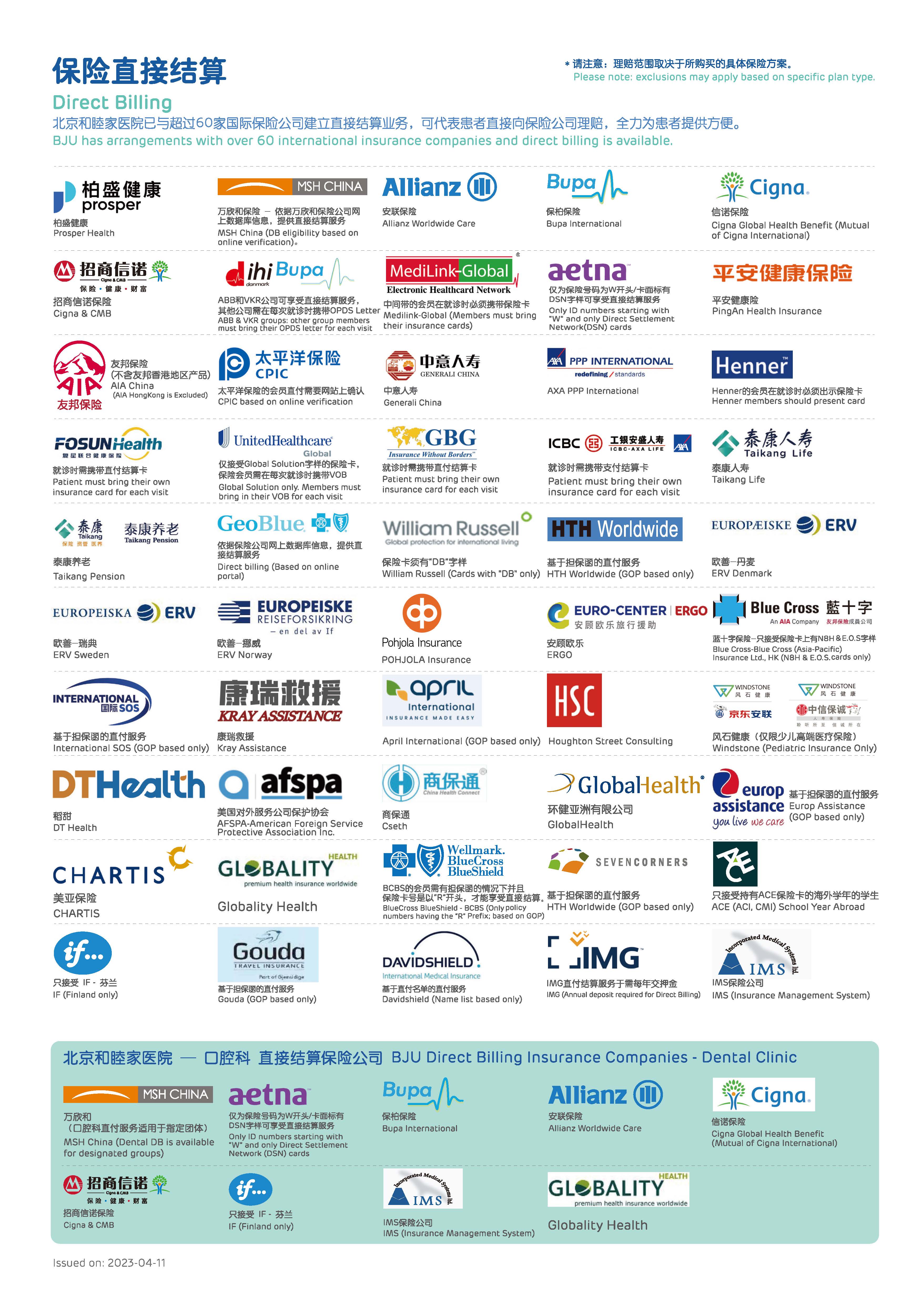
Insurance & Direct Billing
United Family Healthcare accepts health plans offered by most major insurance carriers. We update our list of insurance providers frequently, so call us today if you don’t see yours listed.
How we handle insurance at United Family Healthcare
We bill your insurance provider for each visit, and you cover the co-payment or deductible, just like you would at any doctor’s office. The amount that you owe depends on the specific health insurance plan you have. If you have any questions, call the number on your insurance card to learn more about your coverage. For your co-payment or for those who prefer to pay out-of-pocket, we accept checks, debit, and credit cards.
Please note: We only accept primary insurance coverage for direct billing.
No Insurance? No Problem.
At United Family Healthcare, we think modern, high-quality medical care should be accessible to everyone, including patients without health insurance. Our simple fee structure helps take the guesswork out of healthcare pricing, so you can see a doctor when you want to without breaking your budget. Whether you need a physical, a vaccination or want to address specific health concerns, we make it affordable. For your convenience, we accept checks, debit, and credit cards as payment for your visits.
Insurance Advice
How do I find a suitable health care plan?
If you do an internet search, you will find that there is an overwhelming amount of insurance plans available. But which one is “right” for you and your family, or for you and your employees?
As a user of United Family Healthcare (UFH), you may find convenience in utilizing one of the insurance plans that we offer a direct billing arrangement with. UFH has direct billing arrangements in place with a continually expanding list of insurance providers. The plans are not all alike. They range from comprehensive plans that are designed for more frequent use with cover for annual check-ups, mammography, genealogical exams, prostate screening, vaccinations and dental options, to somewhat simple plans that have been designed primarily for protection when it is needed most, in case of an emergency or serious illness.
What points should be considered when selecting a health care plan?
Overall annual limit: The overall annual limit of an insurance policy can range from less than US$100,000 to several million dollars. The more cover the better since hospitalization can easily cost several thousands of dollars per day in case of an emergency. US$1 million and up is recommended by United Family Hospital and Clinics.
Cover for pre-existing conditions: It is common for healthcare plans designed for individuals and small groups not to include cover for pre-existing or chronic conditions. However, there are some healthcare plans that do cover some pre-existing conditions. Expect those insurance providers to request a full medical history at the time of your application so they can confirm if your condition(s) will be covered or not. You can also expect that such a policy will be two to three times more expensive than a policy that does not include cover for pre-existing conditions.
Emergency evacuation: Most insurance plans designed for expatriates include emergency evacuation. In case of an emergency in a location where suitable healthcare is not available, your insurance company will arrange and pay for transportation costs to get you to the nearest appropriate hospital.
Out-patient treatment: Out-patient treatment is coverage for consultations when you are not checked into the hospital, but rather you have made an appointment to see your doctor. This can include the doctor consultation, lab tests, prescription drugs, and follow up exams. Ask yourself if you have been to see the doctor in the last year or two for something such as a sore throat or stomach condition. If you have, you might like your plan to include cover for out-patient treatment.
Maternity: Typically, large group health insurance will cover maternity without any waiting period because they already have hundreds, if not thousands, of employees on a plan and have therefore collected a large premium from the employer. However, maternity benefits for individuals or small groups often come with a waiting period, so if you are planning to have a baby sometime in the near future, a little planning ahead might save you thousands of dollars. The average waiting period is 12 months, but check your policy details to be sure.
Annual check-ups and routine treatment: Annual check-ups and routine treatments are most likely automatically covered by large group health insurance plans. However, they are also available for individuals and small groups followed by a waiting period, depending on your healthcare plan. Mammography, genealogical exams, prostate screening, vaccinations, and sometimes vision benefits fall under this category. Contact your insurance provider or refer to your policy terms for limitations and requirements.
Dental plans: Dental options often include varying percentages of cover, depending on the level of treatment. For example, many plans include an exam and x-rays, along with one to two cleanings per year, and then 80% coverage for such treatments as fillings and root canals; and then 50% for crowns or bridges, etc. Each plan has different categories and levels of coverage, so it is best to consult with your insurance provider or refer to your policy terms for clarification.
Copyright United Family Healthcare 2014 All right reserved - 京卫网审[2014]第1927号 - 京ICP备13017554号-4





